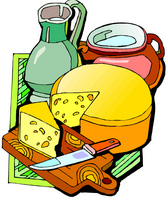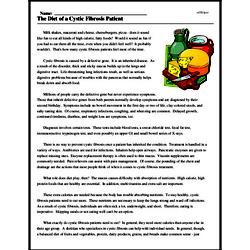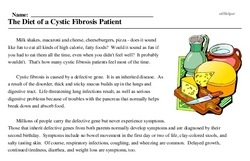The Diet of a Cystic Fibrosis Patient
Milk shakes, macaroni and cheese, cheeseburgers, pizza - does it sound like fun to eat all kinds of high calorie, fatty foods? Would it sound as fun if you had to eat them all the time, even when you didn't feel well? It probably wouldn't. That's how many cystic fibrosis patients feel most of the time.
Cystic fibrosis is caused by a defective gene. It is an inherited disease. As a result of the disorder, thick and sticky mucus builds up in the lungs and digestive tract. Life-threatening lung infections result, as well as serious digestive problems because of troubles with the pancreas that normally helps break down and absorb food.
Millions of people carry the defective gene but never experience symptoms. Those that inherit defective genes from both parents normally develop symptoms and are diagnosed by their second birthday. Symptoms include no bowel movement in the first day or two of life, clay-colored stools, and salty tasting skin. Of course, respiratory infections, coughing, and wheezing are common. Delayed growth, continued tiredness, diarrhea, and weight loss are symptoms, too.
Diagnosis involves certain tests. These tests include blood tests, a sweat chloride test, fecal fat test, immunoreactive trypsinogen test, and even possibly an upper GI and small bowel series of X-rays.




